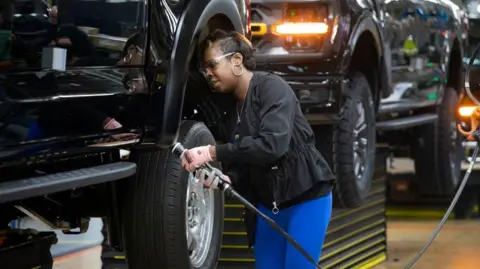Economics editor & Business reporters, BBC News
Chancellor Rachel Reeves has signalled the UK could lower tariffs on US car imports as she tries to broker a trade deal with the Trump administration.
Reeves said she wants “to see tariff and non-tariff barriers reduced between the UK and the US”.
The UK is seeking to lower trade taxes imposed by President Donald Trump of 25% for cars, steel and aluminium and 10% on other British exports.
One of the sticking points for a trade deal in the past has been food standards, but Reeves said the UK would not be reducing these.
Earlier today a document circulated among US business groups and unions seeking views on a potential deal with the UK, focused on lowering UK tariffs on US cars to 2.5% from their current 10%.
The chancellor suggested she was open to this to secure a wider trade deal.
President Trump has already imposed tariffs of 25% on all car imports to the US – including from the UK.
The UK is also facing a broader tariff rate of 10%, and is looking to negotiate an agreement with the US administration, along with dozens of other countries hit with even higher levies – most of which are currently on pause until July.
UK negotiators are working “flat out” to get an agreement that is in the country’s national interest, Reeves told the BBC at an event in Washington.
“We are willing to reduce trade barriers in the UK, those trade barriers that do exist. And we want to build on the relationship that we have,” she added later speaking at a Semafor event.
Some US officials have been positive about the prospects of a deal. Last week US Vice-President JD Vance said there was a “good chance” a trade deal could be reached with the UK.
Speaking to the BBC at an International Monetary Fund (IMF) event on Wednesday, Reeves said the UK was “not going to rush into a deal”.
But she said the government was “confident that working with our partners in the US we can get a better trading relationship and build on the substantial trade that already exists between our two great countries”.
“We want to get the right deal for Britain, to better support our industry, our jobs and consumers,” she added.
Reeves said that the UK had been “really clear” in discussions with US negotiators “that we’re not going to be reducing agricultural standards in the UK”.
“The US administration respect and understand that we have high standards to support British farming, and to support British consumers, and we’re not going to be relaxing those standards,” she said.
Many American farmers use growth hormones as a standard part of their beef production, something that was banned in the UK and the European Union in the 1980s.
The US has previously pushed for a relaxation of rules for its agricultural products, including beef from cattle that have been given growth hormones.
Farmers in the UK warned ministers last week not to dilute British food standards, saying the use of hormones in rearing livestock cannot be accepted.
Shadow chancellor Mel Stride said the Conservatives would “expect” Reeves to stick to agricultural standards “but let’s see the detail as and when there is a deal”.
He said it is “hugely important” to “get these 25% tariffs on cars and steel down” but he said the government should be moving faster on negotiations.
“It’s taken them a long time, in fact, to even have got in the room with the US administration to start discussing these issues, let alone getting a deal now,” he said.
Trump has brought in a large number of tariffs on imports to the US, arguing they will boost US manufacturing and protect jobs.
These include, as part of an ongoing trade war, levies of up to 145% on Chinese goods. China has hit back with a 125% tax on US products.
The move has rattled the world economy, sparking turmoil on global financial markets.
Prices are expected to rise for consumers in the US as a result of the tariffs, due to the companies importing goods passing on higher costs.
The IMF has cut its global growth forecast because of the uncertainty caused by tariffs, and says it expects US growth to be hit the hardest.
 Getty Images
Getty ImagesHowever, Reeves said: “I do understand the concerns the US has about countries around the world that run large and persistent trade surpluses with the US.”
She said the UK “is not one of those countries” so “there is a deal there to be done between the UK and the US”.
She added that she understood “the need to rebalance the global economy”.
This, in part, is why the UK announced on Wednesday a review of low-value imports coming into the UK which are “undercutting the British High Street and British retailers” she said.
This mirrors a US action, with the White House set to clamp down on deliveries under $800 – specifically those sent from China and Hong Kong – on 2 May.
It is set to close a loophole allowing low-value packages to enter the US without incurring any duties.
The removal of the so-called “de minimis” rule will hit companies including fast-fashion firm Shein and Temu, the low-cost retail giant.
Shein and Temu have both warned that they will increase prices “due to recent changes in global trade rules and tariffs”.
The UK government said that the UK Trade Remedies Authority (TRA) would be putting more resources into helping firms report unfair trade practices as part of its review.



